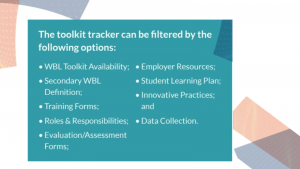Advance CTE’s newly released State Work-Based Learning Toolkit Innovation Tracker links publicly accessible WBL toolkits from across all 50 states and U.S. territories. Well-crafted WBL toolkits allow school districts and industry partners to work together to create a pipeline of career pathways and empower state leaders to ensure that learners have equitable access to programs offering real-world work experience.
The tracker highlights each toolkit’s content across the following categories:

The State Work-Based Learning Toolkit Tracker Analysis provides additional insight into the tracker by highlighting six-state innovations for addressing key program quality components such as equity, data collection, and employer accountability. Below is an example of the kind of analyses featured in the report:
Maryland
- Definition: Work-based learning is defined as “…an instructional strategy that enhances classroom learning by connecting it to the workplace” (U.S. Department of Education, 2017). Work-based learning experiences and programs are traditionally exemplified by job shadowing, internships, and student-based enterprises, and can include an even broader range of related experiences. Work-based learning experiences allow students to “…explore a variety of career options [and] connect the classrooms to the skills needed to be successful in the workplace… [The experiences] are supported by consistent mentoring.”
- Innovative Practice: In addition to emphasizing examples of best practices in designing a work-based learning program through attention-grabbing graphics, such as interest surveys, Maryland has an extensive list of work-based learning-related resources available. This allows CTE administrators, teachers, and employers to build a working knowledge of the science behind work-based learning, internalize the benefits, and better understand how to optimize the experiences for learners. An intentionally designed program means learners will be able to gain the skills they need to successfully navigate their program and enter the workforce fully prepared to contribute.
Through the analysis of 41 publicly available toolkits, several data points emerged regarding the breadth of components found across states:
- State toolkits were organized across multiple approaches, including dedicated websites, comprehensive manual documents, and an online training course in Nebraska.
- Twenty-two state toolkits provided a sample State Learning Plan to guide employers and educators to fully count knowledge and skills gained through the work-based learning experience. Minnesota provided course sequence recommendations to align career seminar courses with work-based learning.
- Twenty-three state toolkits provided employer resources, including sample forms, training documents, liability guidance, and sample evaluations. Alaska, Georgia and Ohio provided extensive resources on labor laws and liability guidance.
One area for improvement that emerged through the analysis was regarding specific support to achieve equitable access to work-based learning for each learner. Very few had toolkits, or linked resources, in multiple languages. Additionally, not all toolkits addressed learners with disabilities. Tracking these toolkits allows Advance CTE to identify additional areas to support, creating equitable frameworks of work-based learning programs for their districts. Last year, Advance CTE released a framework to guide states in building infrastructure that advances access to and completion of equitable work-based learning.
Updates to the tracker will be made quarterly. The analysis and tracker are available for viewing in the Resource Center.
Brice Thomas, Policy Associate
